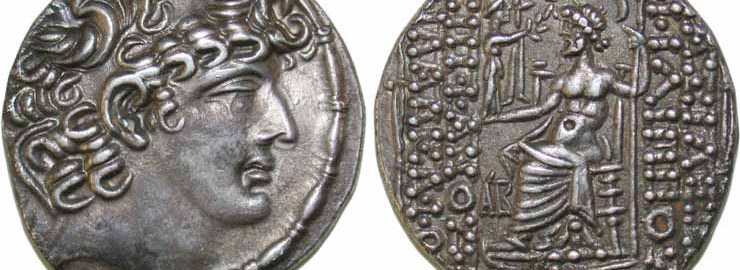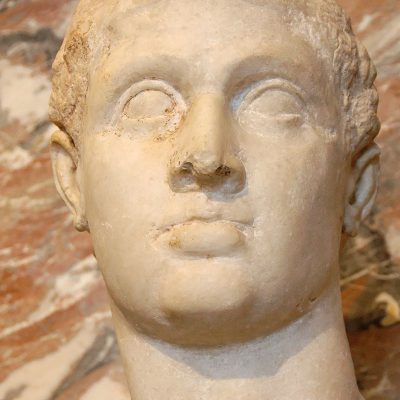Chapters
Gabiniani – this name was related to the group of Roman mercenaries fighting for Egyptian kings – Ptolemy XII and Ptolemy XIII. This term was derived from the name of the governor of Syria, Aulus Gabinius, who left in Egypt part of his troops participating in the recovery of the throne for Ptolemy XII.
Ptolemy XII
Ptolemy XII was the son of Ptolemy IX Soter and Cleopatra Selena and the husband of Cleopatra V. He received the throne from the hands of the inhabitants of Alexandria after the assassination of Ptolemy XI. Throughout his reign he sought above all the recognition and acceptance of Rome, sparing no bribes or gifts for Roman nobles, and supporting Roman campaigns. Finally, he was recognized as the legitimate king of Egypt. The Republic only gave him after 20 years of rule in the country on the Nile, and for a very excessive bribe to pay, the king had to get into Roman debt rich.
When, in 58 BCE, at the request of Clodius, the Roman annexed Cyprus, and the king’s brother-in-law, Ptolemy, also committed suicide, Egypt was militarily weak and almost economically ruined and could not react in any way. The king’s passivity caused a riot in Alexandria. Ptolemy XII, fearing sharing the fate of his predecessor, left the city and fled to the areas controlled by the Romans, while the throne fell into the hands of the king’s daughter – Berenice IV.
The loss of the throne by Ptolemy XII greatly worried his Roman creditors, as she ultimately barred the chances of satisfying their demands. However, they did not accept it and began to act.
Gabinius
Aulus Gabinius during the unrest in Egypt and the escape of Ptolemy XII caused by them served as the governor of Roman Syria. The leading creditor of the King of Egypt – Rabirius Postumus undertook to convince the governor to support Ptolemy’s efforts to regain the throne. Gabinius was promised a prize of 10 talents for his help.
Gabinius had to act on his own, for the Senate, seeking a solution to the problem, reached for the Sibylline Books, which read that armed action in Egypt was dangerous and could end in failure. Therefore, the operation was refused.
The expedition set out from Syria, finally on the pretext of defeating pirates hiding in the lands controlled by Berenice and threatening the Syrian coast. The action turned out to be easy. The Roman Corps advanced very quickly, thanks to the talent of Mark Antony commanding a forward-moving ride and the help of Antipater – a Jewish nobleman who led to the bloodless surrender of the crew of the Peluzjum fortress, blocking entry into Egypt.
The pacification of the country on the Nile did not last long, apart from a few skirmishes with the royal guard, the intervention did not meet much resistance and quickly seized the capital. Berenika was killed, and Ptolemy XII regained the throne. Gabinius and the army soon returned to Syria to suppress the riots that were going on there.
The governor regretted his actions in Egypt. After returning to Rome, he was convicted and had to return 10,000 talents to the state. Due to the fact that he did not have such a large sum, he was banished.
Gabiniani
Leaving Syria, Gabinius left Ptolemy a part of his troops for protection – 2,000 pedestrians and about 500 auxilia on horseback. Most of the soldiers, henceforth called Gabiniani, were supposedly Gauls and Germans, they became the guarantors of Ptolemy’s power and were used for the most difficult tasks. Ptolemy directed his faithful troops to suppress peasant revolts, plunder the mighty and other activities which he could not entrust to the Egyptians. What’s more, their ranks gradually increased because they were fed by various refugees from the Republic. The Gabiniani, lavishly paid for by the ruler, quickly adopted the Alexandrian lifestyle, started families and completely broke ties with the Roman world.
In 52 BCE Ptolemy XII died, and the rulership of Egypt, according to the king’s will, was taken over by his children – Cleopatra VII Philopator, also called Cleopatra the Great and her younger brother Ptolemy XIII. Marek Bibulus, then Syria’s governor, then addressed them in 50 BCE. The Romans were preparing to act against the aggressive Parthans, for this purpose they gathered all the forces available in the east. Bibulus also decided to reach for the Gabiniani, still serving the Egyptian throne. To this end, he sent his sons to Egypt. However, Gabiniani, terrified of the prospect of returning to the oppression of Roman discipline, killed messengers. Cleopatra was terrified of the murder of a military camp. She certainly feared the revenge of Rome. So she immediately ordered the capture of two direct killers and sent them to Syria so that Bibulus could personally judge them. The governor, however, showed a truly stoic peace, receiving news of the death of his sons. He sent the murderers back to Alexandria, informing them that only the Roman Senate could judge them, and then returned to his duties.
Meanwhile, Egypt was hit by drought. The harvest turned out to be very poor – only in Central Egypt did it work well. Cleopatra, fearing that hunger might push Alexandria’s people to take radical action, decided that Central Egypt’s grain could only be sold to Alexandria. The peasants reacted by revolts and abandoning arable fields. However, the queen pacified these moods quickly thanks to the use of Gabiniani.
Civil war in the republic
In 50 BCE, the Roman Republic was devoured by the civil war. Julius Caesar stood against Gnaeus Pompey supported by the Senate. Pompey and his supporters left Italy and sailed to Greece, where he began to gather forces for a decisive trial with Caesar. Troops were drawn from all over the East, not forgetting Egypt, where Pompey the Great sent his elder son, Gnaeus Pompey the Younger, asking for support.
Cleopatra did not refuse, she sent 50 warships and 500 mounted soldiers recruited from Greece to Greece, who did not refuse to fight this time. However, the Egyptian reinforcements did not take part in the fight because Pompey the Great’s army was defeated in the battle of Farsalos. Upon learning of the defeat, Bibulus’s fleet of Egyptian ships went into disarray and the Alexandrian squadron returned to the metropolis.
Pompey’s assassination
Soon after the defeat at Farsalos, Pompey himself arrived in Egypt, wanting to gather a new army there. He headed for the Pelusium, where the king camped at the head of the army, opposite the forces gathered by Cleopatra – there was also a civil war in Egypt. During the meeting of Egyptian commanders and advisers to Ptolemy XIII, the decision was made to kill Pompey – this task was entrusted to the Cabinet, who had previously served under his command during the eastern campaigns.
Pompey on board his ship waited for an audience with Ptolemy. The Egyptians directed a small boat for him, explaining that a three-row boat could stranded. On board were, among others former tribe Lucius Septimius, whom Pompey remembered from earlier campaigns, along with centurion Salwius. When the Roman commander boarded and the boat headed for the port, Septimius and Salwius killed Pompey, whose head was then cut off and handed over to the arriving soon Caesar.
Caesar in Egypt
After landing in Egypt, Caesar had to face Ptolemy’s army. The core of 20 thousand infantry and 2,000 the driving forces of the Egyptian forces commanded by Achillas were Gabinans. They were probably composed of cohorts, mentioned in the “Alexandrian War”, grouped at the back of the main fighting lines constituting a real “fire brigade” of Egyptian troops besieging Caesar – they were directed to stabilize the situation on the most vulnerable sections of the front.
Not much is known about the Gabinian activities during Caesar’s Egyptian campaign. After the final breakup of Egyptian troops, the death of Ptolemy XIII and the capture of Alexandria, they no longer appeared on the pages of history. Their place was taken by the legions taken by Caesar to Egypt: XXVII, XXVIII and XIX.









